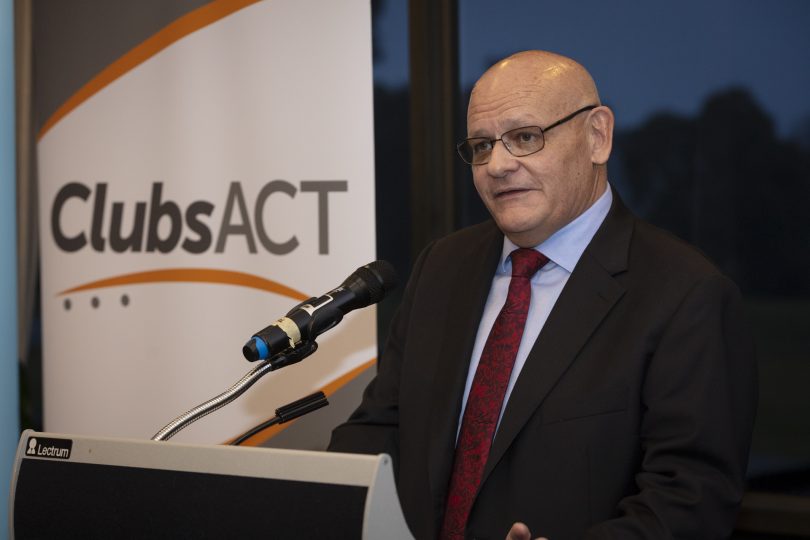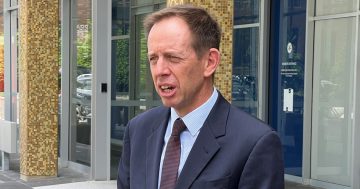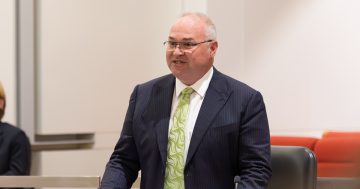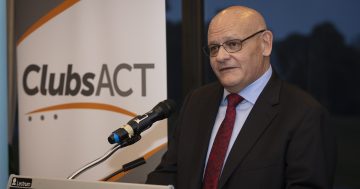
Clubs ACT CEO Craig Shannon has slammed ACT Labor’s move to introduce its election policy for poker machine regulation to the Assembly, apparently without consultation with the sector. Photo: Thomas Lucraft.
The clubs sector is reeling from ACT Labor’s policy announcement to reduce the number of pokies to 1000 by 2045, along with several measures designed to reduce gambling harm.
Clubs ACT CEO Craig Shannon said the industry had been “absolutely blindsided” by the announcement and had been given two days’ notice it was happening.
Detail has been particularly light on the policy intention to use club land to address community needs around affordable housing and aged care facilities.
The policy stated the outcome would be “more affordable housing across Canberra” and that a Community Clubs Diversification Team would be established.
ACT Labor leader Andrew Barr also mentioned there would be “bespoke” adjustments to each club’s land lease depending on what was appropriate to each area.
Mr Shannon expressed his concern there’d been no consultation on this plan, given Labor backbencher Dr Marisa Paterson has signalled she’s going to move amendments to the current gaming bill being debated in the Legislative Assembly in two weeks, effectively legislating the ACT Labor policy without a guarantee it will be re-elected in October.
“We don’t have any more detail apart from what’s been made public, and I think it’s unreasonable to announce this two weeks prior to tabling it in the Assembly,” he said.
Mr Shannon argued the idea that using club land would have a “magical impact” on social housing shortages “seems ridiculous” and said while clubs had been arguing for years to be given more chances to diversify revenue through its land assets, “this is not what we were seeking”.
“The bureaucracy in this town has not supported the diversification agenda of clubs … it’s a very slow process to get any developments underway or approved,” he said.
“We’ve constantly raised concerns about the challenges with the system currently and difficulty in dealing with EPSDD [Environment Planning and Sustainable Development Directorate] – I thought they would want the comfort of an effortless system before changing it.”
He argued there was a “disconnect” in policy in the Territory, where addiction to drugs was treated as a health issue, and people were guided to assistance, but if they experienced problem gambling, the clubs weren’t being utilised as places that could guide people to support.
“It’s potentially going to become easier to use meth in this town than use a poker machine,” Mr Shannon said.
“Tying this to harm minimisation is dumbfounding for me.”
He slammed all parties for using gambling harm as a “political football” and said election campaigns weren’t appropriate places to have this conversation.
“They’ve put this on the table five minutes to midnight before caretaker mode commences,” Mr Shannon said.
“This is going to have a direct impact on people’s day-to-day lives … for those who benefit from the revenue clubs put back into sports, subsidised food and providing places for Canberrans to congregate without the expectation for them to spend money.”
Canberra’s other two main political parties are also not impressed.
Shadow Gaming, Racing and Community Clubs Minister Mark Parton said this was the “worst scenario” for Canberra’s community clubs sector.
“[ACT Labor] talks a big talk about the government assisting clubs to diversify. That’s the same line they’ve been trumpeting for a decade and, in reality, they’re not doing much at all,” he said.
“The only positive for the clubs sector out of this announcement is that at least the clubs finally know their fate. At least the clubs know that there is a death sentence, and they don’t have to sit in the holding cells waiting for the next election cycle to discover their fate.”
The Canberra Liberals are expected to reveal its club and gaming machine policy in the coming weeks.
Reducing the number of poker machines in the Territory has been a focus for the ACT Greens, but Gaming Minister Shane Rattenbury said his party wanted even stronger harm reduction measures than what had been proposed.
“We need a system with mandatory precommitments and loss limits for players implemented through a universal player card across all machines (linked by a central monitoring system),” he said.
“Disappointingly, Labor’s policy lacks these evidence-based controls that are considered to be the most effective in reducing harm.”
Region approached ACT Labor to find out exactly what aspects of their policy would make up Dr Paterson’s amendments during the next sitting week, but did not receive a response in time for publication.




















